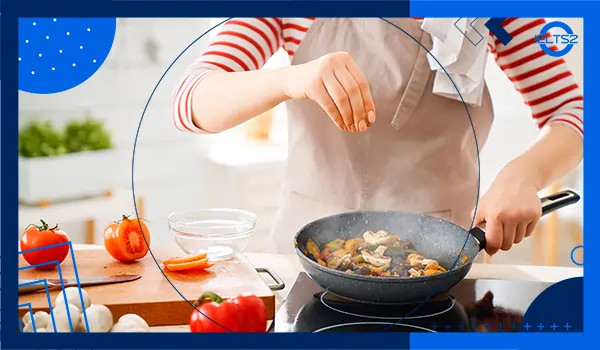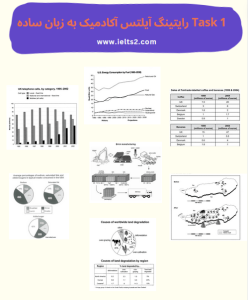نمونه سوالات اسپیکینگ آیلتس درباره آشپزی (پارت 1 2 3)
در این بخش بیش از 20 مورد از نمونه سوالات اسپیکینگ آیلتس نمره 9 درباره “موضوع آشپزی ” را با هم میبینیم. این مجموعه از آخرین سوالات گزارش شده از سنترهای برگزار کننده آیلتس در ایران و خارج از کشور مربوط به پارت 1، 2 و 3 می باشند و شانس تکرار آن ها در آینده بالاست. در ادامه مطلب همچنین نکات گرامری، لغات و دلایل دریافت نمره 9 را به طور مشخص توضیح داده ایم تا راهنمایی برای علاقمندان باشد. 1000 نمونه سوالات اسپیکینگ آیلتس با جواب PDF پارت 1 2 3 پیشنهاد بعدی ما به شما عزیزان است.
نمونه سوالات اسپیکینگ آیلتس درباره موضوع آشپزی (پارت 1)
1. Do you enjoy cooking?
Yes, I really enjoy cooking. It’s a creative outlet for me and helps me relax after a stressful day. I love experimenting with new ingredients and trying out international recipes. Cooking at home also allows me to eat healthier and save money. My favorite thing to make is pasta with homemade sauce because it’s simple yet delicious. Overall, cooking is both a hobby and a practical skill that I value greatly.
2. How often do you cook?
I cook almost every day, especially during the weekdays when I prefer homemade meals over eating out. On weekends, I like to try more time-consuming recipes like stews or baked dishes. Cooking frequently has improved my skills and given me confidence in the kitchen. I also enjoy planning meals in advance, which makes the process more efficient and enjoyable. It’s become an essential part of my daily routine.
3. What kind of food do you like to cook?
I enjoy cooking a variety of dishes, but I’m particularly fond of Italian and Asian cuisines. I often make stir-fries, curries, and pasta dishes because they’re flavorful and easy to customize. I also bake occasionally, especially when I have guests. The versatility of different cuisines keeps cooking exciting for me. Trying new spices and techniques always keeps me curious and engaged.
4. Did you learn cooking when you were a child?
Yes, I started learning basic cooking skills when I was around ten years old. My mother was my first teacher, and she let me help her with simple tasks like chopping vegetables or stirring sauces. Over time, I gained more independence in the kitchen. Those early experiences laid the foundation for my love of cooking. I believe learning young helped me develop a deeper appreciation for food and nutrition.
5. Who usually does the cooking in your family?
In my family, the cooking is mostly shared between me and my mother. We often divide the responsibilities depending on who’s free that day. Sometimes we cook together, which turns it into a fun bonding activity. My father occasionally helps with grilling or making breakfast. Sharing kitchen duties has created a balanced and cooperative atmosphere in our home.
6. What’s your signature dish?
My signature dish is a creamy mushroom risotto. It’s rich, comforting, and packed with flavor. I’ve perfected the balance of seasoning and texture over time, and my friends always request it when they visit. The dish requires patience and attention, especially when stirring the rice, but I find the process enjoyable. It’s the one recipe I’m truly proud of mastering.
7. Do you prefer cooking alone or with others?
I enjoy both, depending on my mood. Cooking alone can be peaceful and meditative, allowing me to focus entirely on the process. On the other hand, cooking with others, especially family or friends, adds a social and joyful element to the experience. We often chat, share stories, and collaborate. So while I love the solitude of cooking alone, I also cherish the shared experiences that come with group cooking.
8. Do you watch cooking shows or videos?
Absolutely! I often watch cooking shows on TV or YouTube. They inspire me to try new recipes and improve my techniques. I especially enjoy shows that explain the science behind cooking, like how heat affects flavor or how to balance spices. Watching professionals cook is both entertaining and educational. I’ve picked up many tips and tricks just by observing them closely.
9. Have your cooking habits changed over time?
Yes, definitely. When I first started cooking, I relied heavily on recipes and stuck to simple dishes. Over the years, I’ve become more confident and now improvise more often. I use fresher ingredients, pay attention to presentation, and even experiment with fusion dishes. My focus has also shifted toward healthier meals. Cooking has evolved from a necessity to a true passion.
10. Is cooking popular in your country?
Yes, cooking is quite popular in my country. Many people prefer home-cooked meals over restaurant food because of tradition, health, and affordability. There’s also a strong cultural emphasis on food as a way of bringing people together. Recently, there’s been a rise in cooking classes and food-related content online, which has made it even more accessible and trendy.
نمونه سوالات اسپیکینگ آیلتس درباره موضوع آشپزی (پارت 2)
Describe a meal you cooked that you felt proud of. You should say:
What the meal was
When you cooked it
Who you cooked it for
And explain why you felt proud of it.
Band 9 Answer:
One meal I cooked that I felt particularly proud of was a traditional Indian dinner I prepared for a small group of international friends during my university years. It included chicken tikka masala, basmati rice, garlic naan, and a side of cucumber raita. I cooked it during our cultural food night, where everyone had to contribute a dish from their country.
I spent the entire afternoon preparing the meal. I marinated the chicken overnight with yogurt and spices to enhance the flavor. Then, I grilled it and added it to a creamy tomato-based sauce. I also made the naan bread from scratch, which required kneading the dough and letting it rise properly before baking. Although it was time-consuming, I enjoyed every step of the process.
I cooked this meal for five of my close friends from different countries, including Japan, Brazil, and Germany. They had never tried Indian food before, so I felt both excited and nervous. To my delight, they absolutely loved it. They were impressed not just by the taste, but also by the variety of spices and textures in the meal. One of them even asked me for the recipe!
What made me proud was the fact that I managed to create a restaurant-quality meal without any help, and more importantly, I introduced a piece of my culture to people from other parts of the world. It felt deeply satisfying to share something so personal and see it genuinely appreciated. Their positive reactions boosted my confidence in my cooking abilities and made me realize that food has a unique power to connect people across cultures.
That experience also encouraged me to cook more often and be more experimental in the kitchen. It reminded me that cooking is not just about nourishment; it’s also an art and a means of expressing care, creativity, and tradition.

نمونه سوالات اسپیکینگ آیلتس درباره موضوع آشپزی (پارت 3)
1. Why do people cook at home even when restaurants are available?
Despite the convenience of restaurants, many people cook at home for health, budget, and emotional reasons. Home-cooked meals are often fresher, less processed, and more aligned with individual dietary preferences. Cooking also provides a sense of control over ingredients and portion sizes. Financially, it’s more economical than dining out regularly. Moreover, cooking can be therapeutic and a way to bond with family. The act of preparing food has cultural and emotional value that restaurants often lack.
2. How has modern technology changed the way people cook?
Modern technology has revolutionized cooking through smart appliances, apps, and digital platforms. Tools like air fryers, instant pots, and induction cookers have made cooking faster and more efficient. Recipe apps and cooking videos have empowered people to learn new skills from the comfort of their homes. Even grocery shopping has become easier with online delivery services. Technology has made cooking more accessible, less time-consuming, and often more precise, especially for people with busy lifestyles.
3. Do men and women cook differently?
Traditionally, women were seen as the primary cooks in many cultures, but today, gender roles in cooking have become more fluid. Men may approach cooking more experimentally, often treating it like a hobby or a challenge, while women might focus on practicality and nutrition. However, these differences are not fixed. Many women are also highly creative cooks, and many men cook daily out of necessity. The differences are more cultural and individual than gender-based.
4. Should cooking be taught in schools?
Absolutely. Cooking is a fundamental life skill that everyone should learn. Teaching it in schools promotes self-sufficiency, health awareness, and budgeting skills. It can also foster creativity and teamwork. With rising rates of fast-food consumption and poor diets, equipping children with basic cooking knowledge is crucial. It helps them make informed food choices and develop lifelong healthy habits. Plus, it’s a fun and practical subject that balances theory with hands-on experience.
5. Why do some people dislike cooking?
Some people dislike cooking because they find it time-consuming, stressful, or monotonous. Others may lack confidence in their skills or dislike cleaning up afterward. In some cases, a busy lifestyle or lack of kitchen space can make cooking impractical. However, negative attitudes often stem from inexperience. With proper guidance and simplified recipes, many people who dislike cooking can gradually learn to enjoy it or at least appreciate its value.
6. What impact does culture have on the way people cook?
Culture heavily influences ingredients, techniques, and cooking habits. For example, Asian cuisines often use wok-frying and a variety of spices, while Western cuisines might focus on baking and dairy. Culture also affects meal structure, the importance of presentation, and even dining etiquette. Cooking is a reflection of history, geography, and tradition. Cultural identity is often expressed through food, making cooking a meaningful act that connects people to their heritage.
7. How can cooking affect your lifestyle?
Cooking can significantly impact lifestyle in both positive and negative ways. On the positive side, it promotes healthier eating, saves money, and encourages mindfulness. It also fosters a routine and helps people unwind. On the downside, if one is overly obsessed with perfection or cooking becomes a chore, it may lead to stress. However, overall, cooking is generally a beneficial practice that enhances both physical health and emotional well-being.
8. Is it important to follow recipes exactly?
Not necessarily. While following recipes is crucial for beginners or when precision is needed—like in baking—experienced cooks often treat recipes as guidelines. Cooking allows for flexibility, creativity, and adaptation based on taste, available ingredients, or dietary restrictions. That said, understanding the purpose behind each step in a recipe can help people modify it effectively. So, while recipes are helpful, personal flair is equally valuable.
9. How has globalization influenced cooking styles?
Globalization has led to a blending of culinary traditions across the world. Ingredients that were once regional are now globally available, and people experiment with fusion cuisines. For example, sushi burritos or Indian-style pizzas are products of cultural blending. Access to international recipes online has also broadened cooking knowledge. While it enriches the culinary landscape, globalization also poses a risk to traditional recipes being lost or commercialized.
10. What role does cooking play in social gatherings?
Cooking plays a central role in most social events, whether it’s a family dinner, a holiday feast, or a casual get-together. It brings people together, creates memories, and fosters a sense of belonging. Often, people associate certain dishes with celebrations or loved ones, which gives food emotional significance. In many cultures, hosting a meal is a gesture of love and hospitality. So, cooking strengthens relationships and enhances social bonds.
عوامل مؤثر در کسب نمره ۹ در پاسخها درباره موضوع آشپزی
در زیر موارد مربوط به پاسخ سوالات اسپیکینگ موضوع آشپزی مورد بررسی قرار می گیرد:
از نظر گرامر:
تنوع ساختارها: استفاده از جملات مرکب، شرطی، مجهول، و نقل قول غیرمستقیم.
درستنویسی بینقص: بدون خطای گرامری در زمانها، تطابق فعل و فاعل، یا کاربرد حروف اضافه.
استفاده از زمانهای متنوع: مانند گذشته کامل، حال کامل، حال ساده و آینده برای ایجاد انسجام زمانی.
از نظر واژگان:
لغات سطح بالا: واژههایی مثل “therapeutic”, “versatility”, “fusion cuisine”, “self-sufficiency”.
کولاكیشنهای طبیعی: مثل “restaurant-quality meal”, “perfect the balance”, “boosted my confidence”.
اصطلاحات طبیعی: مانند “bonding activity”, “creative outlet”, یا “piece of my culture”.
انسجام و پیوستگی:
پاسخها به صورت منطقی گسترش یافتهاند، با استفاده از لینکرهای طبیعی مثل Moreover, On the other hand, To my delight، که به انسجام ایدهها درباه سوالات اسپیکینگ موضوع آشپزی کمک میکند.
مطالبی برای مطالعه بیشتر
لغات آیلتس موضوع آشپزی (Cooking)
اهمیت مهارت آشپزی (Agree or Disagree IELTS Essay)
متن انگلیسی در مورد غذا با ترجمه فارسی
Students should study the science of food and how to prepare it
اسپیکینگ آیلتس تاپیک غذا (پارت 1 2 3)
تعیین سطح رایگان اسپیکینگ ❤️
نمونه سوالات اسپیکینگ آیلتس درباره “موضوع آشپزی ” پارت 1 2 3 را به همراه سمپل های نمره 9 آن ها با هم دیدیم. در ادامه نمونه سوالات دسته بندی شده اسپیکینگ آیلتس پیشنهاد آخر ما به دوستان گرامی هست. این نمونه سوالات اسپکینگ از پرتکرار ترین تاپیک های این بخش و همچنین جدیدترین موضوعات می باشند. این مجموعه توسط یکی از سایت های معتبر و فعال آیلتس تنظیم شده است. همچنین برای تعیین سطح و تعیین رایگان نمره اسپیکینگ و دریافت جدید ترین سمپل های نمره 9 در کانال تلگرام اسپیکینگ ما همراه باشید و به ادمین برای تعیین نمره اطلاع دهید.






